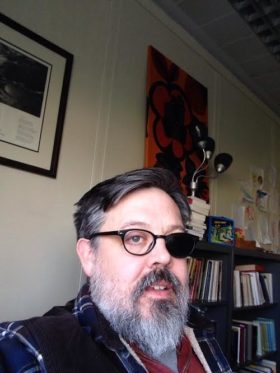A History of Fire
April 3, 2017c. 1680-1780 1. A theory Here’s a story about how wrong we can be, and for how long: For a century phlogiston held the universe together, filled all the spaces,…
c. 1680-1780
1. A theory
Here’s a story about how wrong we can be, and for how long:
For a century phlogiston held the universe together, filled
all the spaces, fed all the fires.
Burn a log
and you burned the phlogiston held inside.
That powdery ash left behind was the log
rendered smaller and pure.
A rock had no phlogiston, but paper flowers—crackled, vanished—
were virtually nothing but. How’s that
for a bright idea?
The true measure of a thing itself?
Burn it. Put the ash on a scale.
Meanwhile…
born into and living inside
the lifetime of phlogiston lived one
David Hume, who grew up saying No
to everything. After he settled
the matter about cause and effect
(that neither exists in this world),
he strolled into his billiards room
to send one ball hurtling
into others that scatter. He calmly lit
the sweet contents of his pipe each night, certain
that he did not know
why it burned, but it burned.
2. Into thin air: Fighting fire with fire
In 1778 it was a known fact that people
contained almost no phlogiston at all,
all of us, almost always, fireproof, yet Joseph Priestley got burned.
He’s the one gave Bentham that idea . . .
the greatest happiness for the greatest amount of people . . .
but he’s nearly forgotten now. Discovered
ammonia, sulfur dioxide,
and “dephlogisticated air,”
Lavoisier called it oxygen
and changed fire forever—everything suddenly
so much less
than the sum of its parts.
Bentham couldn’t let go—
of the utilitarian idea sunk so deeply
into each of the words on each of the pages
he wrote everyday: his History of Electricity,
his Introduction to the Principles of Morals and Legislation,
his Punishments and Rewards, and The History of the Corruptions of Christianity,
which the Church of England promptly burned.
Priestley died believing his words,
tried by fire, remained
in a bag he carried. Today
we say
he carried a bag of ash.
—Kirk Robinson (Lake County)

Kirk Robinson is a poet living in Northwest Indiana with his wife Kate and their four children. He works at Calumet College of St. Joseph as an associate professor of English.
Poetry Prompt: The Evolution of Theories
Choose something in the universe that fascinates you—time, gravity, starlight, lightning, earthquakes, the human heart, blood, cells, etc. Write the history of what you choose through the scientific theories which have sought to explain it. What relationship do the theories have to the everyday way we perceive the world? Part of your challenge will be using vivid images to represent abstractions.
Indiana Humanities is celebrating National Poetry Month by sharing a poem and prompt every day in April. Indiana Poet Laureate Shari Wagner selected these poems and wrote the prompts.

